Table of Contents
- What are local citations?
- Why are local citations important?
- What are the types of local citations?
- How to build local citations
- Why accuracy and consistency matter for local citations
What are local citations?
A local citation is any mention of your business information online, particularly your NAP; name, address, and phone number.
As a local business looking to be discovered online, local citations are crucial to your digital identity. You can typically find them in websites and business directories like Yelp and Google Maps.
Here’s what a local citation looks like:
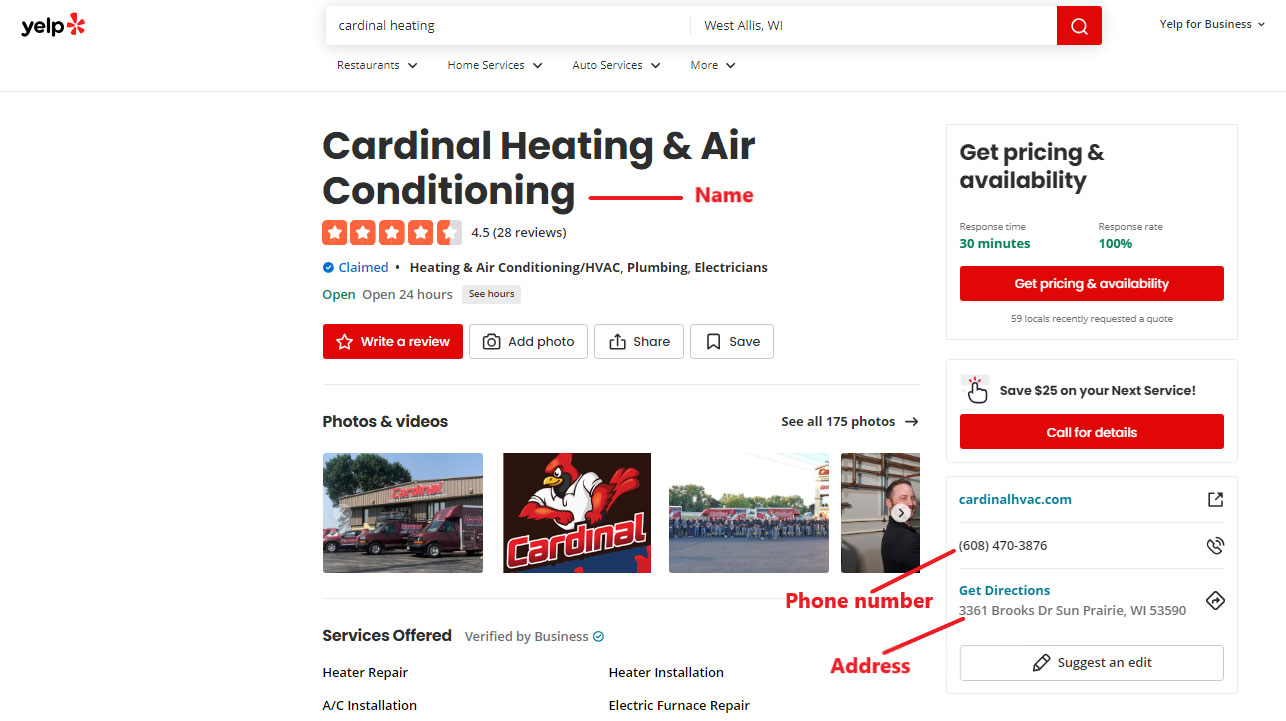
Many directories, like this one (Yelp), allow you to add more than just your NAP (name, address, phone number). You can also include:
- A business description
- Your website
- Photos and videos
- Reviews
- Services offered.
Why are local citations important?
At their core, local citations are a way to “put yourself out there” and help more people discover your business online. But they do more than just that.
Citations can help your local SEO
Many search engine optimization (SEO) experts believe citations can increase a business’s chance of ranking higher in search engine results. As a local business, you can appear on search engines in two ways:
In the organic search results (with your website):
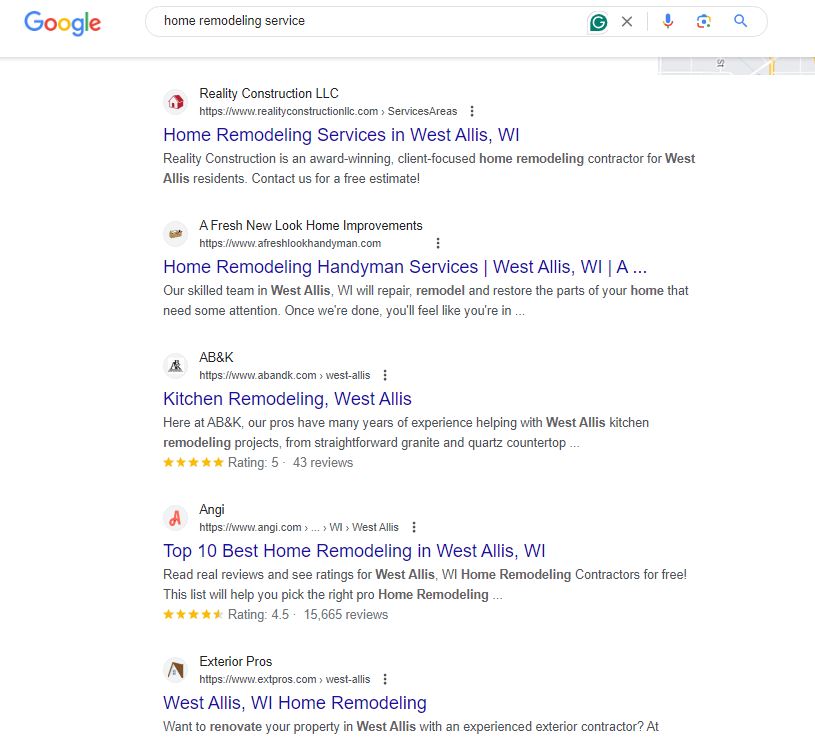
In the map pack (with your local listing):
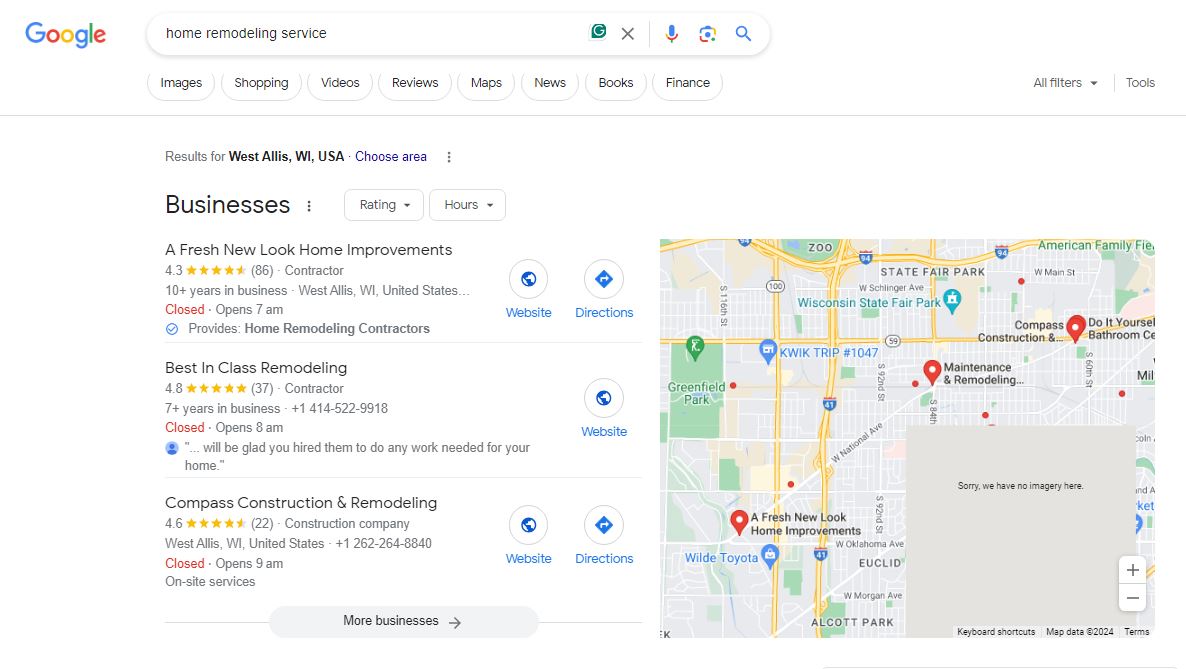
SEO experts think citations can influence both results. Here’s a list of factors that affect search engine results, according to BrightLocal’s survey of experts in 2023:
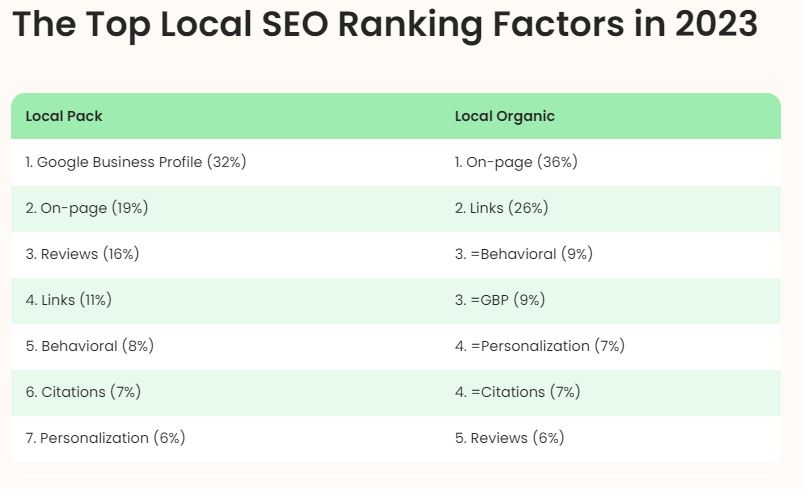
Citations, while low on the list, still carry a significant percentage.
How it works
Prominence, relevance, and distance to search are the three main things Google considers when ranking Google Business Profiles.
Citations can influence the prominence and relevance of your Google listing. The more trustworthy citations you have, the more prominent your business appears to Google.
The more consistent and accurate your citations are across websites and listings, the more relevant your business appears.
Citations can also impact your website’s rankings. Businesses with more citations from trustworthy sources are likely to rank higher.
Citations can help more people discover your business online
If you’ve tried using a local service in your area before, you’ve probably checked sites like Yelp, Home Advisor, and Angi.
Those are a few popular directories where people discover local businesses, besides the Google Map pack. They’re also popular citation sources.
Apart from being popular, business directories like this often dominate local search results. Here’s what turns up for the query “drywall west allis”:
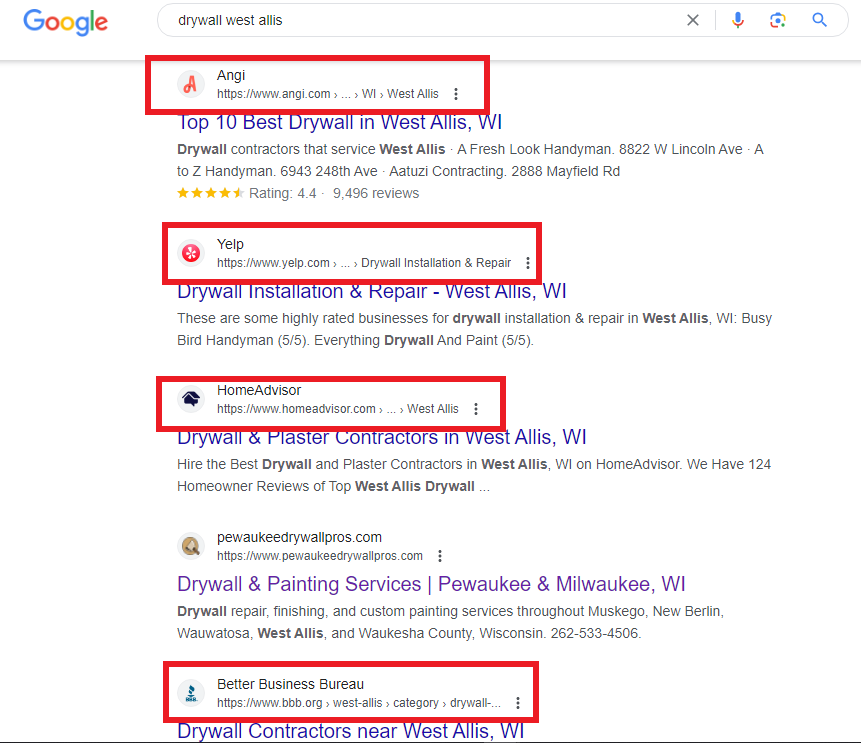
Instead of drywall websites, most of the top results are popular business directories that list drywall services.
This simply means you must build citations in these directories if you want more potential customers to find your business online.
At the end of the day, citations aren’t a do-or-die affair for local SEO, but it definitely makes sense to include them on platforms where people often search for businesses like yours.
What are the types of local citations?
There are two types of local citations you can get:
- Structured citations
- Unstructured citations
Structured citations
Structured citations list your business details, i.e., your name, address, and phone number (NAP), in a particular format. These are typically found in business directories and social media sites.
They are sometimes referred to as listings, and many often include several more details, such as your website, services offered, and pictures.
Here’s what a structured citation looks like:
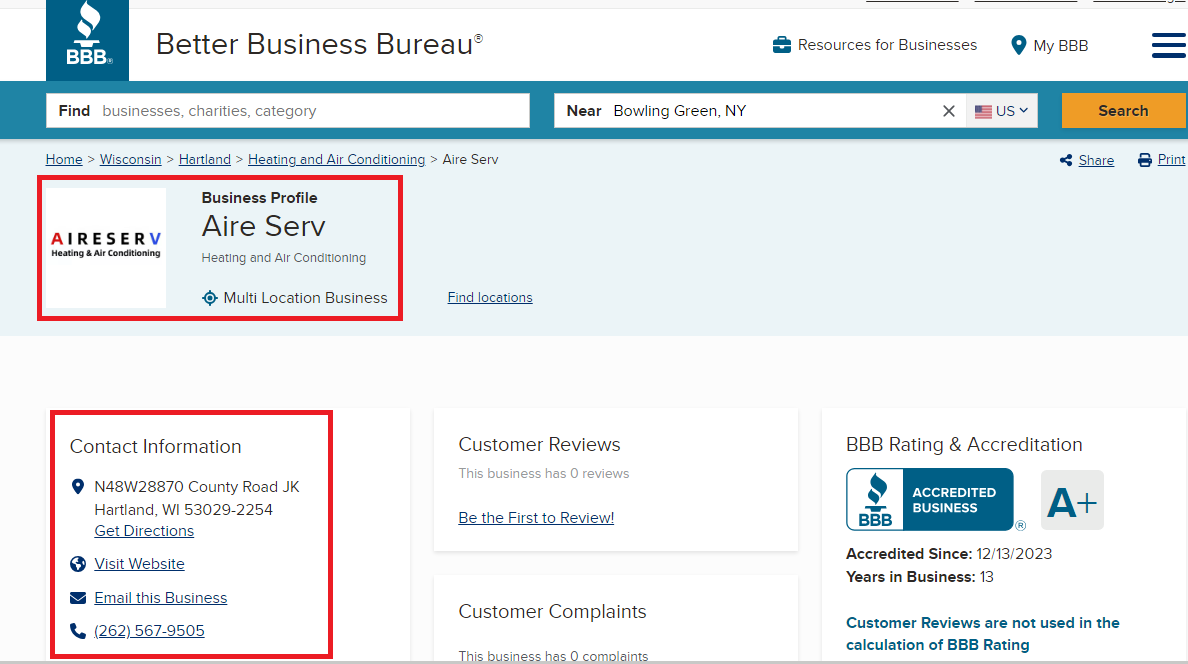
Unstructured citations
An unstructured citation is simply a mention of your business details, as opposed to a structured listing of your details in a directory or social media platform.
Unstructured citations won’t always be generated intentionally or with your knowledge since they often appear when other individuals or organizations talk about your business. You’d find them in blog posts, social forums, or press publications.
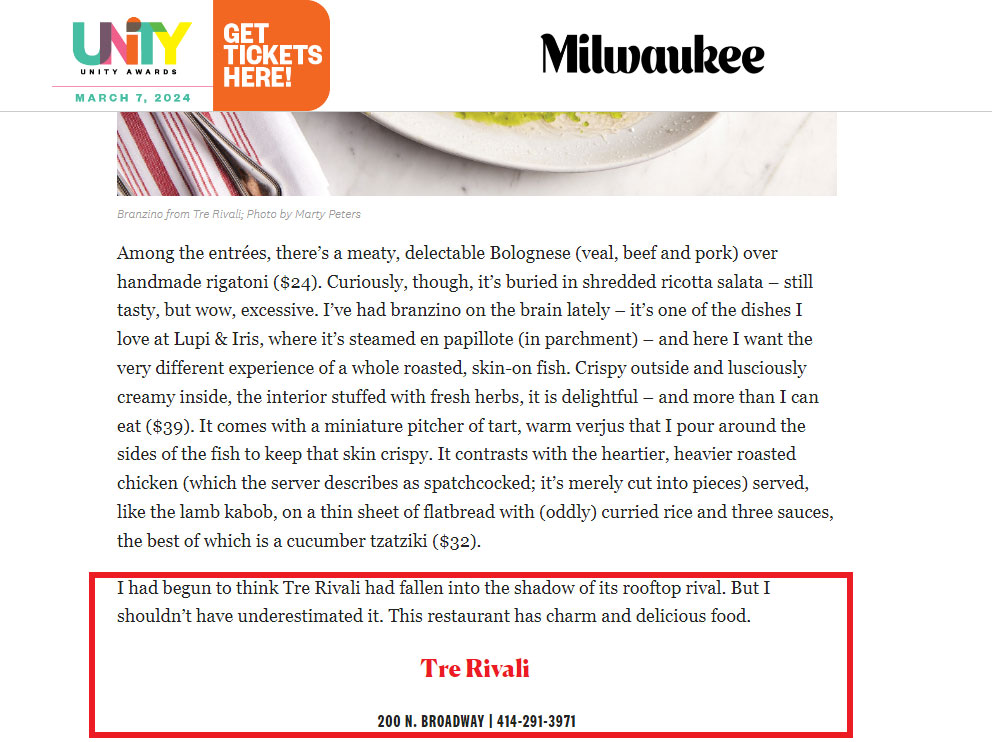
How to build local citations
There are at least X ways to build local citations, structured and unstructured:
- Use the leading data aggregators
- Submit to popular business directories
- Submit to relevant directories in your niche and location
- Gain inspiration from competitors
Tip: When building citations, go for quality over quantity. There are many directories for building local citations, but not all are relevant to your business. Prioritize citation sites that cater to your business niche and location.
For instance, as a lawyer, you probably don’t want to be listed in Home Advisor since that’s a site for home improvement contractors.
Now, let’s dive into each step:
Use the leading local data aggregators
Ordinarily, you would have to manually submit your citations to each site. But considering that there are hundreds of citation sites, this would obviously be too time-consuming, especially if you are a multi-location business.
That’s where local data aggregators, or LDAs, come in.
What are local data aggregators?
In the simplest terms, local data aggregators are organizations that collect information about businesses and distribute this information to other platforms. These platforms include citation sites, but they also cover mobile apps, search engines, and navigation systems.
Instead of manually submitting your citation to each site, you can submit to an LDA, which would then automatically push your business information across multiple sites.
Undoubtedly, this saves time, but that’s not the only advantage of using a data aggregator. Typing your business details manually across hundreds of sites leaves room for mistakes. After all, you’re only human.
An LDA simply spreads out the exact same information you’ve submitted. This ensures your business information is accurate across multiple sites, and this, as we’ve mentioned, is crucial when building local citations.
Who are the “main” data aggregators?
Any business can submit information to a data aggregator. You simply have to create an account and input your business information, and then the LDA verifies your details before feeding it to other platforms.
There are at least three data aggregators you should be aware of. These are the ones that are most popular for local businesses:
- Foursquare
- Data Axle (Local Listings)
- Neustar Localeze
Two of these LDAs, Foursquare and Data Axle, are free for small businesses. Foursquare allows you to claim your listing (if it’s already on the platform) or create a new one for free.
You simply have to search for your business and claim it or create a new listing if it doesn’t exist.
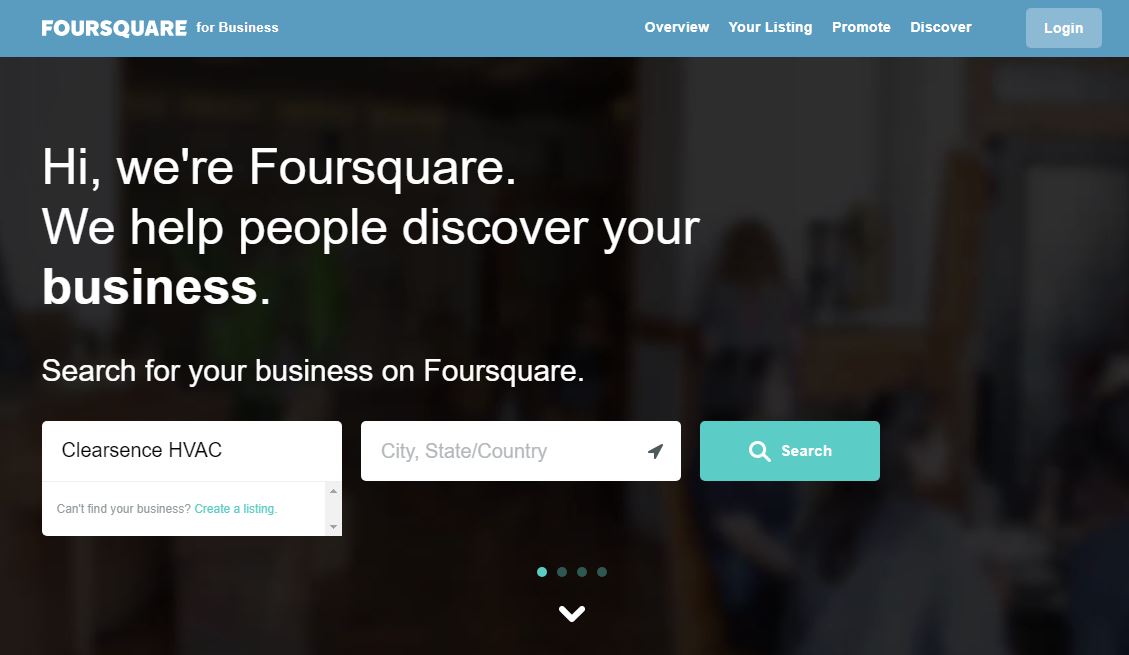
If you’re a multi-location business, Data Axle lets you add and manage up to 10 locations for free. For more than 10 locations, you would have to use the paid service.
Note: Data Axle Local Listings is the current version of Express Update, which was launched in 2010 by Data Axle (formerly known as Info Group).Also, if you’re familiar with data aggregators, you might know Factual. They were one of the big LDAs up until 2020, when they were merged with Foursquare. Factual has since shut down its submission portal. So as of now, it’s safe to assume Foursquare owns Factual’s database.
You can decide to directly submit and manage your listings in each of these LDAs yourself, or you can rely on an agency or a citation-building service like BrightLocal.
As a small business with just one or a few locations, it’s totally okay to save cash and manually submit your citations across free LDAs.
Note: If you’re submitting your data manually, you might have to deal with certain verification processes. For instance, if your business name has a location name in it (such as “West Allis HVAC”), you’ll have to prove that it is indeed your registered business name.Businesses commonly include locations in their names to spam citations and rank higher in the Google Map Pack. Data aggregators are aware and naturally try to prevent this.
Submit to popular business directories
The local data aggregators wouldn’t submit your data to every popular directory. There are certain business directories you shouldn’t miss out on as a local business. These include:
- Yelp
- Bing Places
- BBB
- YellowPages
So, to be sure you are listed in these directories, you’ll have to submit to them yourself and complete your details. There’s no question the most important directory of all is Google (or Google Business profile), and this is the one you’ll spend more time optimizing.
Check out our guide on how to build and optimize your Google Business Profile.
You can find more relevant directories for your business in our list of top U.S.A citation sites.
Which directories should you submit to?
You might be wondering if you have to submit to every site on that citation source list (or other lists out there, for that matter). The answer is not really.
We’ll be the first to admit that getting many relevant citations can help, not just to get more eyes on your business but to increase your organic rankings. But the key word here is “relevant.”
You don’t want to waste time on citation sources that aren’t worth it. So, how do you know which ones are?
The best practice is to hone in on citation sites relevant to your niche and location.
Submit to relevant directories in your niche and location
Industry and geo-specific directories are used by consumers who need your service within their area.
Someone looking for a restaurant will check TripAdvisor. People looking to rent or sell homes will consult real estate platforms like Zillow. If you need home services, you’ll probably visit Angi or HomeAdvisor.
That should explain why industry-specific citations are key to your local business.
There’s also the fact that geo and industry-specific citations simply hold more value to search engines than generic ones. In plain English, your organic rankings are more likely to improve if you focus on citations relevant to your niche and location.
Here are a few ways to discover relevant directories:
Use Google search
Go to Google and search for a service in your location, e.g “HVAC new berlin”:
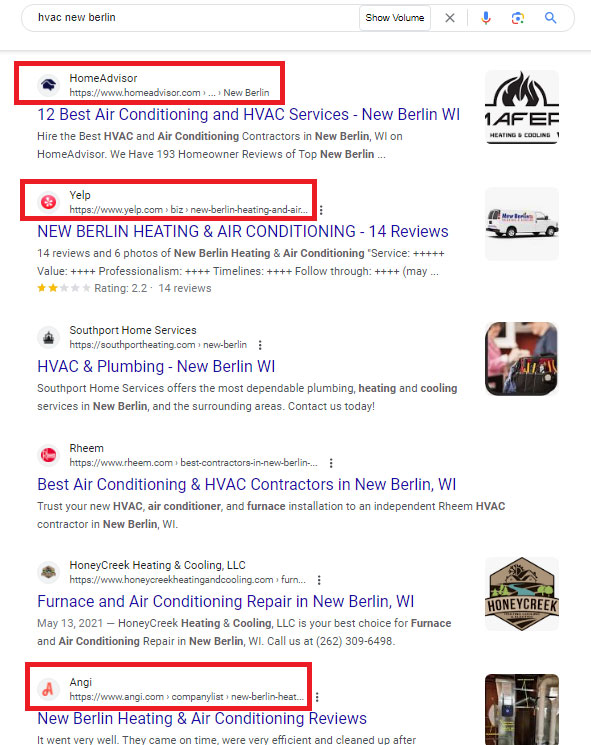
Check the first 150 results to see what directories appear. Here, we see Yelp, HomeAdvisor, and Angi, since “hvac” is a home improvement service and these directories are also used in that location.
This method may be tedious and not all that effective, so you can use more direct search terms like “[location] business directory,” “[industry] business directory,” “[location] chamber of commerce.”
Use an industry citation list
Many citation services, such as BrightLocal and WhiteSpark, provide lists of citation sources by industry. These lists save you the time of having to hunt down industry-specific citations.
BrightLocal is one of the most reputable platforms, so we will recommend their lists.
Check competitors’ citations using an SEO tool
Since your competitors operate in your niche and location, you can check their citation sources to see what you’ve missed. How do you do this?
By analyzing their backlink profiles.
A website gets backlinks when other websites link to its pages (learn more about backlinks). Since most directories allow businesses to include their website, they will naturally act as backlinks to those websites.
Analyzing a competitor’s backlink profile shows which directories are linked to their website. There are several SEO tools that can analyze backlink profiles, such as Semrush, Brightlocal, Ahrefs, and Ubersuggest.
Here’s the backlink profile of a Milwaukee HVAC business using Ubersuggest
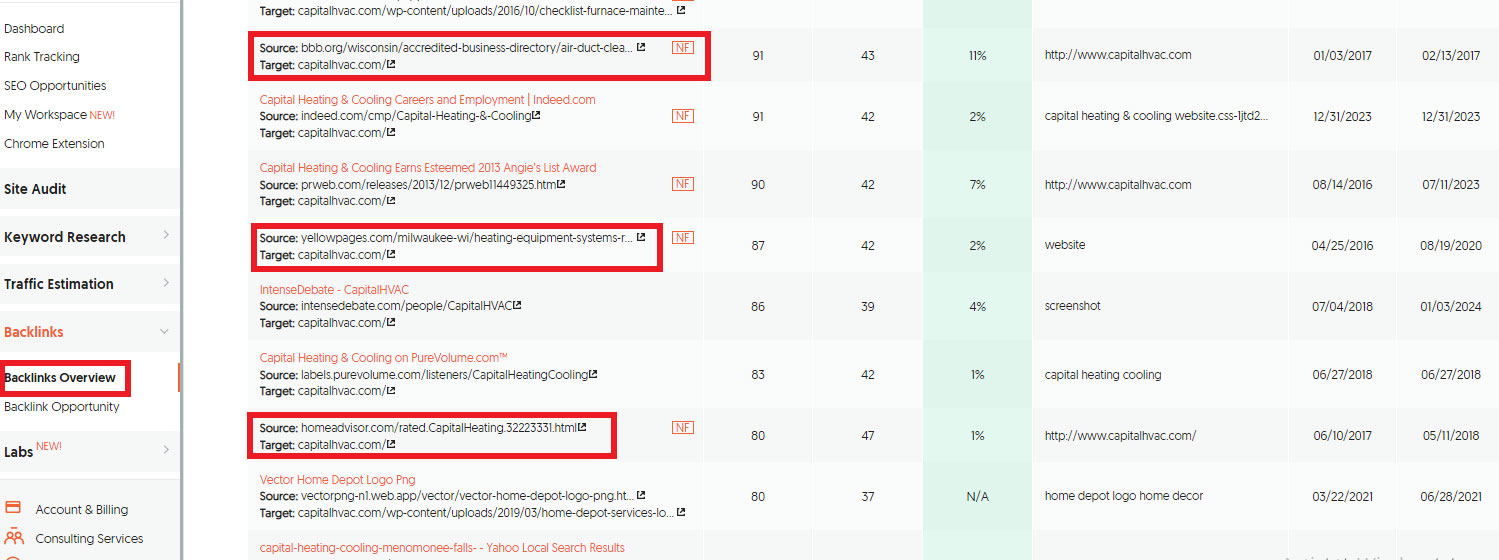
The links circled in red are directories. You’ll have to click on links that look like citation sources to confirm if they’re indeed one.
Make sure to check that their spam scores are legit. Anything above 29 and it’s probably a spam website.
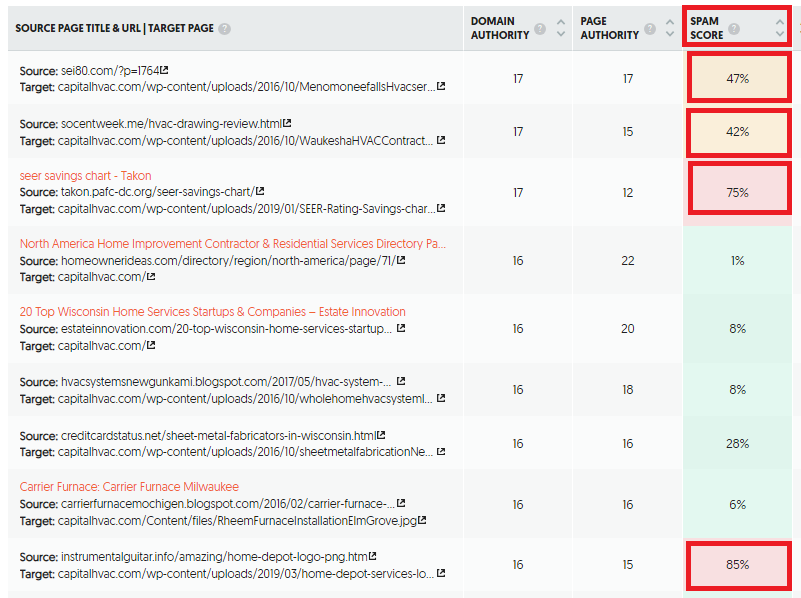 Note: We’re illustrating with Ubersuggest because it has several useful free features and is more beginner-friendly than most. This makes it ideal if:
Note: We’re illustrating with Ubersuggest because it has several useful free features and is more beginner-friendly than most. This makes it ideal if:- You’re an SEO novice.
- Your business has a thin website and less than five locations.
Ubersuggest is not nearly as robust as the other SEO tools mentioned. You’re better off with those if you already have a handle on SEO of if you’re dealing with a bigger multi-location business.
Analyzing backlink profiles to find citations can be tedious, especially if the competitor has a lot of backlinks. The example given above had more than a thousand.
It’s easier to use a local citation tracking tool. This will simply list your competitor’s citations. No need to scour through hundreds of links trying to figure out which are citations.
Use a citation-building service
Citation building and management services may be the easiest way to add relevant citations, but they don’t come cheap.
These companies partner with popular data aggregators and are integrated with hundreds of citation sites. With them, you can build and submit your citations from one place, as opposed to manually building and managing multiple citation sites.
You’ll simply have to decide if the reduced labor is worth the money.
A few things you can do with citation tools:
- Audit your existing citations to instantly spot necessary updates/corrections.
- Track competitors’ citations to find new opportunities.
- Get relevant citation recommendations.
Some of the best citation tools out there are Whitespark, BrightLocal, and Yelp.
Acquire unstructured citations
Once you’ve figured out structured citations, you can turn your attention to unstructured citations.
These are more difficult to build than unstructured citations. You get unstructured citations when a blog post, a press article, a reviewer, or someone in a forum mentions your business.
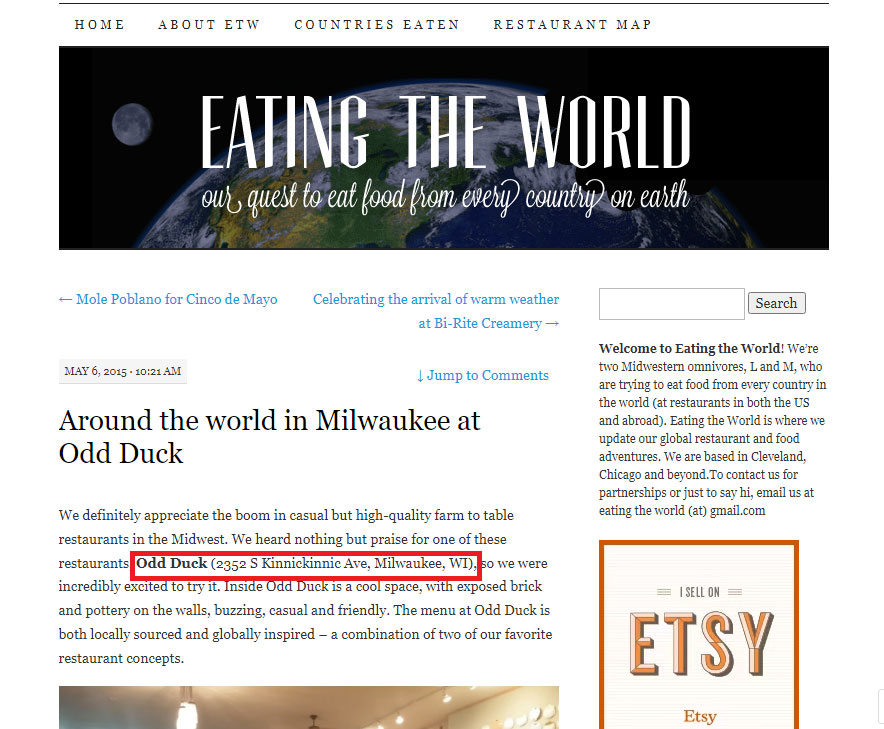
This means other people have to be interested enough to talk about your business. If you know anything about marketing, you know creating that kind of reputation and goodwill is never easy.
There are ways to go about it, but before we dive in, you should understand that there are two types of unstructured citations:
- Linked unstructured citations: These citations mention your business and link back to your website.
- Unlinked structured citations: Mention your business but do not link it to your site.
Linked citations are always the better option. These links are usually do-follow links, which transfer link authority and directly impact organic rankings.
Tip: There are two types of backlinks: do-follow & no-follow.Do-follow links directly impact SEO, as they pass some authority from the website that linked to to yours.
No-follow links have no direct impact, as they pass no authority.
How to find unstructured citations
There are different ways to secure unstructured citations. Some are expensive, and most involve relationship-building. So it’s definitely no piece of cake, but far from impossible.
Use HARO
HARO (Help A Reporter Out) is a site that connects journalists with credible sources of information and stories i.e you, as the expert in your niche.
After signing up, you’ll receive daily email alerts for journalist inquiries like this one:
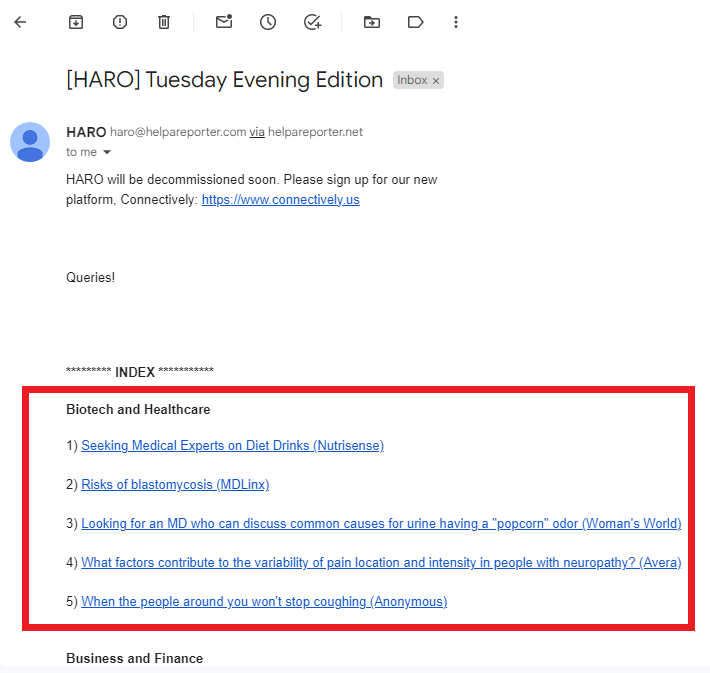
They might cite you in the published article if you choose to respond and share what you know.
Responding to an inquiry doesn’t guarantee anything. It ultimately depends on the journalist to decide if they found your information useful and if they will mention your business. They’ll typically have to sift through several responses like yours before choosing what’s best.
You have to make your response stand out if you want it to be used. This means providing authentic information, going as in-depth as much as you can, and even using personal examples.
Most importantly, don’t forget to attach your business details to each response.
Reach out to local bloggers or DIY-ers
Local bloggers are always in search of new topics. You can reach out to the ones in your niche or a related industry to either provide inspiration or act as a source of information.
If they decide to partner with you, you get a chance to be featured on their blog. These bloggers always have their contact information on the site or at least a contact form, so that’s a good place to start.
Starting a relationship with local bloggers might seem tricky. You don’t want to come across as desperate or too demanding
Our recommendation is to be straightforward. But most importantly, ensure you’re offering something they’ll consider valuable. Things local bloggers would likely consider valuable:
- An expert opinion on a popular or controversial topic in their niche.
- A guide (with visual descriptions) on a subject they haven’t already covered in-depth.
- Proven insights on popular topics or questions from their readers (if they have a comment section, go through to see if there are any relevant questions you can confidently cover).
Finding local publications in your niche to reach out to is easy. Simply run a search for a common topic or question. For example, if you run a drywall business, you could search for something like, “Should I drywall my garage?”
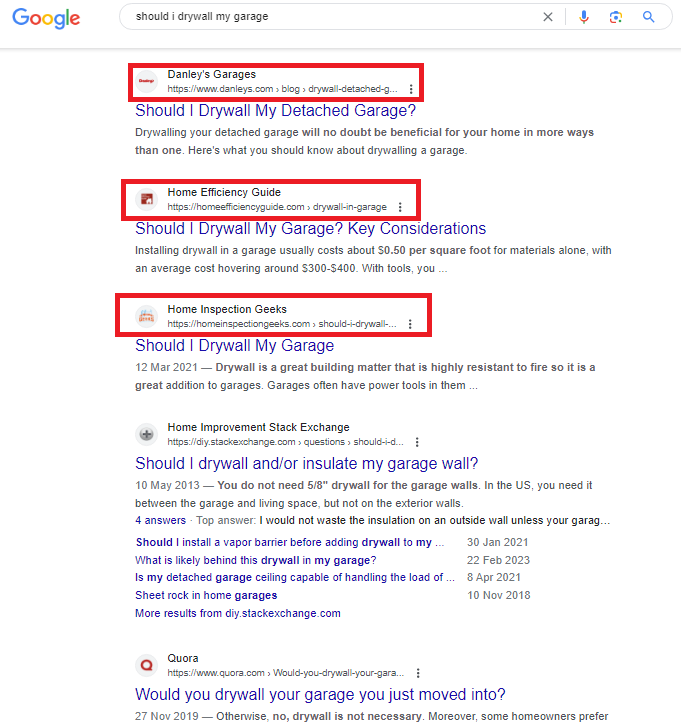
Many of the results are home improvement blogs, which is a niche that’s pretty related to drywall.
If you’re wondering about what common topics to search for, learn how to discover informational keywords.
To find more local bloggers, you can search for something like: “best [your niche] bloggers.”
Try not to contact direct competitors, as their websites will also appear in the search results.
Sponsor or participate in community events
Local businesses sponsor or host community events to generate publicity. Unstructured citations are just one of the few benefits of doing so.
You don’t necessarily have to host these events. Sometimes, just participating is enough to get mentioned by the online press.
As with most public events, the trick is getting local journalists or publications to be interested enough to provide coverage. An obvious recommendation is to lean into themes or events the local community is passionate about.
Why accuracy and consistency matter for local citations
Your business information needs to stay consistent across all your citations. For instance, you shouldn’t have one phone number in one listing and a completely different number in another one.
Inaccurate information on your citations can do two things:
Negatively affect your search visibility
Google generally relies on the data in your citations to confirm what it knows about your business.
If the details across your citations are an exact match, Google considers it safe to showcase your business information. But if there are inaccuracies in certain citations, your business appears less trustworthy.
Since the search engine tries to avoid providing unreliable information, your search visibility can suffer as a result.
Erode your consumers’ trust.
If someone tries to reach your business for the first time and finds that the phone number is incorrect, you can bet they won’t feel confident about doing business with you.
Consumers generally don’t have a lot of trust to give. Fumbling important details like your NAP is enough reason for them to avoid your business.
Tying up loose ends
At this point, you’re probably worried that you have inaccurate citations out there, causing damage.
If you’re using a citation management service, you can run a NAP audit. This will point out incomplete or inaccurate citations, which you can then rectify. You can also hire a citation cleanup service.
Better still, hire a local SEO agency to provide comprehensive citation management. Besides managing citations, they can also optimize your Google Business Profile and handle your local SEO strategy.



